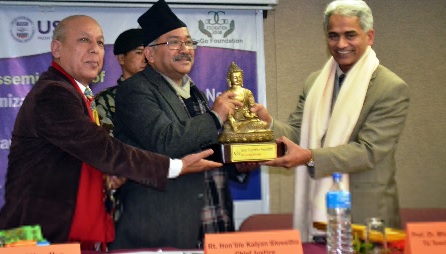‘Civil Society Organizations evolving in Nepal’
 Narayan Prasad Ghimire / Kathmandu: Civil society organization (CSO) is taken as one of the essential pillars of a functional democracy. With the advent of political freedom in Nepal, CSOs are gradually getting space and attracting attention on various issues of human rights. But, how the CSOs are functioning and what’s their sustainability was an uncharted issue till the recent time in Nepal.
Narayan Prasad Ghimire / Kathmandu: Civil society organization (CSO) is taken as one of the essential pillars of a functional democracy. With the advent of political freedom in Nepal, CSOs are gradually getting space and attracting attention on various issues of human rights. But, how the CSOs are functioning and what’s their sustainability was an uncharted issue till the recent time in Nepal.
In this background, the CSO Sustainability Index of Nepal (2014), the first of its kind, has been made public in the Capital City on Thursday.
A non-government organization, GoGo Foundation, with the support from USAID made public this report which has shown that the sustainability of Nepal’s CSO as ‘evolving’.
Having the characteristics of the sustainability as enhanced, evolving and impeded, Nepal’s CSOs are evolving with a score of 4.4. It suggests the CSOs are not generally harassed by the government, but they do face several bureaucratic difficulties with registration; they seek foreign aid owing to lack of domestic resources; they generally lack fair elections for executive committees, rely on staffs hired on part-time or project basis; they often find they are unable to influence legislation substantially, however, offer a wide range of goods and services. Despite this, the government has recognized the contributions of CSOs in strengthening democracy and providing services.
As per the report, though the media cover the CSO activities well, the media often present national CSOs as urban-based and out of touch with local communities. The report has pointed out the lack of internal democracy, transparency and accountability among the CSOs.
“The relationship between civil society and government is characterized by both confrontation and cooperation, and on the part of government, by ambivalence towards civil society that ranges from distrust to recognition of its utility in the context of service delivery,” mentioned the report.
To draw these characteristics of Nepal’s CSOs, the measuring standard in the report were- legal environment, organizational capacity, financial viability, advocacy, service provision, infrastructure and public image.
At the programme, GoGo Foundation Chairman Kedar Khadka shed light on the Nepal report and shared that the Nepal report was one among South/East Asia including Bangladesh, Cambodia, Indonesia, Philippines, Sri Lanka and Thailand.
On the occasion, Director of Democracy and Governance Office at USAID, Maria E Barron, said it was good that Nepal’s CSOs’ condition was evolving. However, more vibrant role of CSO was essential to ensure good governance and bolster democratic values.
Dr Koirala conferred GoGo Foundation Award
At the same programme, Chief Justice Kalyan Shrestha conferred the GoGo Foundation Award 2015 and the GoGo Foundation Award Running Shield on Dr Bhagawan Koirala. The Award carries a purse of Rs 11,111.
Dr Koirala was honoured with the award in recognition of his contribution to building good governance, especially in medical institutes with financial transparency and reform measures.
Addressing the programme, CJ Shrestha said only positive thoughts could lead us to positive action that deserve respect and reward.
Similarly, Chief Commissioner at the National Information Commission, Krishna Hari Baskota, said the NGOs in Nepal need to devote to national cause. He complained that many NGOs have bad track record in Nepal.
Former Chief Commissioner at the Commission for Investigation of Abuse of Authority (CIAA), Surya Nath Upadhyay said it is high time we Nepalis developed thoughts for good work and good governance.
Foundation Chairman Khadka said the sustainability of CSOs in Nepal was evolving and was helpful to prop up good governance. But, there were still a lot to do to make CSOs fully sustainable. RSS
